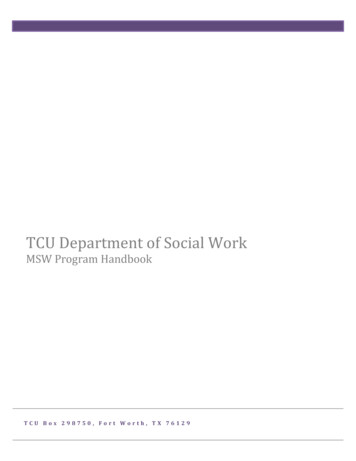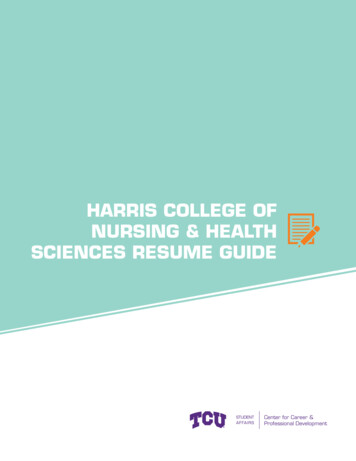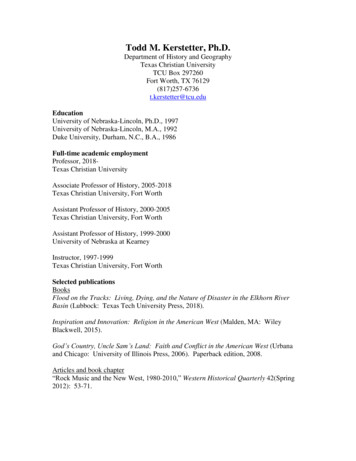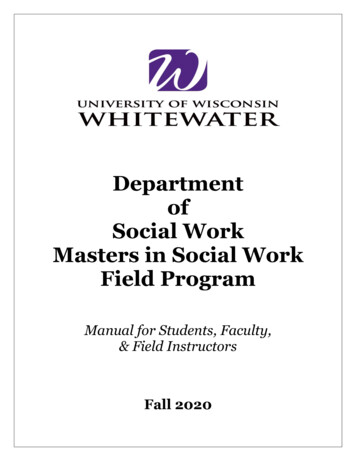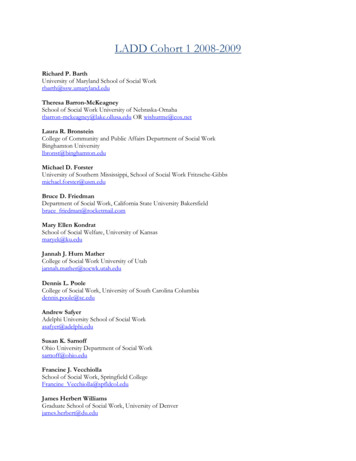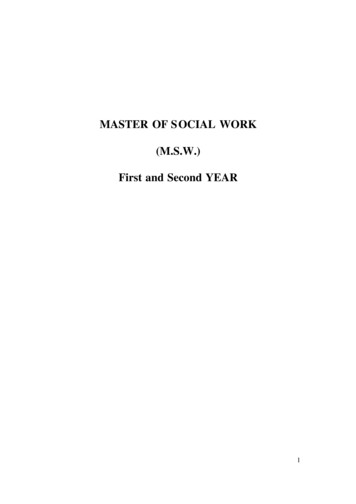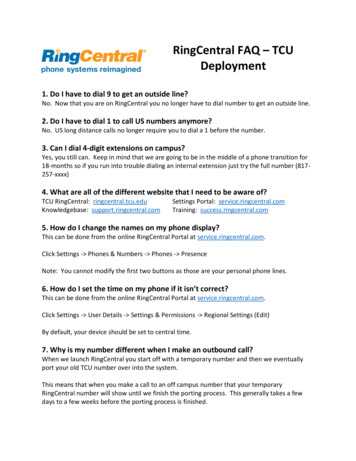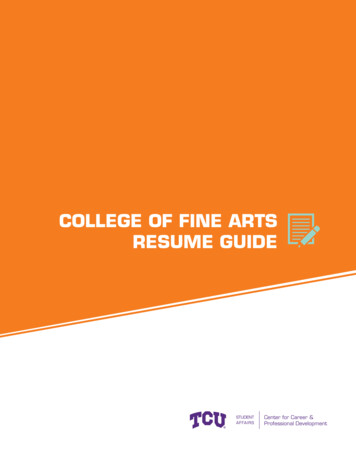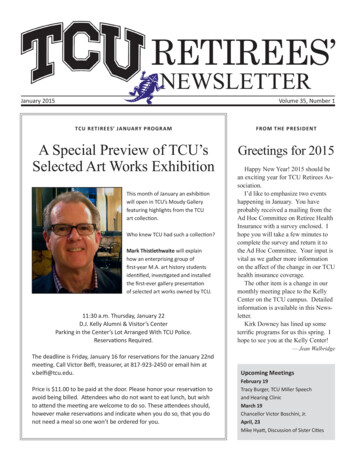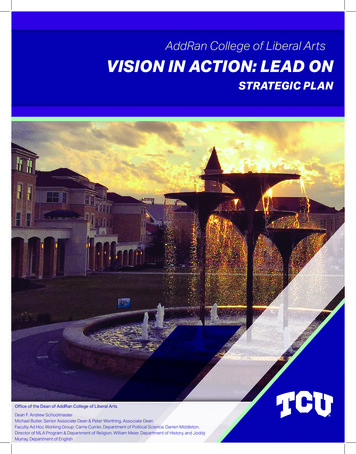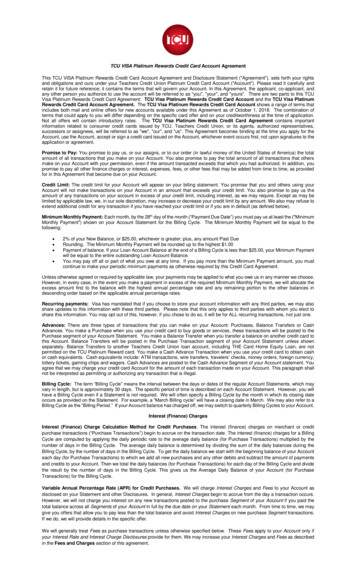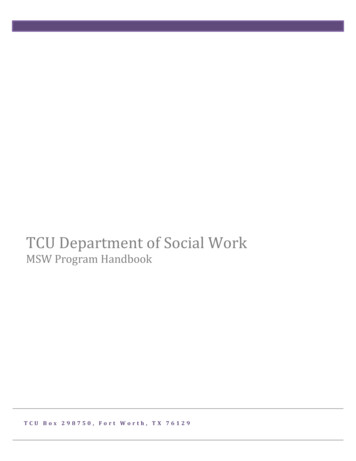
Transcription
TCU Department of Social WorkMSW Program HandbookTCU Box 298750, Fort Worth, TX 76129
Social Work MSW Program HandbookTable of ContentsDepartment of Social Work Contact InformationTCU MissionTCU VisionTCU Core ValuesHarris College Of Nursing and Health Sciences MissionDepartment of Social Work MissionDepartment Faculty and Staff Names and Contact InformationSECTION I: MSW POLICIESAcademic AdvisingAcademic Warning Status and TerminationAdmissions Committee and ProcessProcess for AdmissionFollow-up and Offer AcceptanceAdmission RequirementsTraditional StudentsAdvanced-Standing StudentsCourse CurriculumFoundation CurriculumFoundation Curriculum CoursesAdvanced CurriculumAdvanced Curriculum CoursesCourse Load RequirementsDirected Study CoursesElectivesField Hour CreditGoals of the MSW ProgramGrading PolicyGraduationLeave of AbsenceLicensure ExamMedical Withdrawal/Course Reduction/Retroactive WithdrawalPass/No-Credit Grading OptionStudent Participation in Program PolicyTermination from the MSW Program2
Term Limits for CompletionTransferring CoursesSection II: OTHER RESOURCESHarris College Academic Resource CenterTCU Career ServicesTCU LibrarySection III: APPENDIXMSW Program RequirementsNASW Code of EthicsTexas State Board of Social Work ExaminersNASW Standards for Cultural Competence in Social Work PracticeTCU Student Handbook3
TEXAS CHRISTIAN UNIVERSITYwww.tcu.eduDepartment of Social WorkHarris College of Nursing and Health SciencesWebsite: www.socialwork.tcu.eduMailing Address:TCU Box 298750Fort Worth, TX 76129The Department of Social Work has been committed to excellence in preparing generalist SocialWork practitioners since its inception in 1975. As the University has grown and modified itsmission, so has the Department. Both the University and the Department emphasize ethicalbehavior, life-long learning, service to the community, and the importance of a knowledge base.Social Work has long been viewed as the conscience of the University and as specifically applyingthe University mission in its educational process. The University values dignity, respect,inclusiveness, tolerance, and ethical leadership qualities consistent with Social Work values.The Master of Social Work Program mission is consistent with the Social Work profession’spurpose and values and the program’s context. The mission of the MSW Program to prepareethical and competent advanced social work practitioners who promote human rights andeconomic and social justice with diverse clients in the global communityTCU MissionTo educate individuals to think and act as ethical leaders and responsible citizens in the globalcommunity.TCU VisionTo create a world-class, values-centered university experience for our students.TCU Core ValuesTCU values academic achievement, personal freedom and integrity, the dignity and respect of theindividual, and a heritage of inclusiveness, tolerance and service.Harris College Of Nursing and Health Sciences MissionThe mission of the Harris College of Nursing and Health Sciences is to enhance the humancondition by preparing graduates who think and practice as ethical leaders, and by advancingknowledge of health and human development within the global community.Department of Social Work MissionTo prepare ethical and competent generalist and advanced social work practitioners who promotehuman rights and economic and social justice with diverse clients in a variety of settings in theglobal community.4
TCU DEPARTMENT OF SOCIAL WORKName/PositionSh’Niqua Alford, MSW, LCSWAssistant Professor ofProfessional PracticeAssistant Field DirectorSamantha Bates, Ph.D.Assistant ProfessorNada Elias-Lambert, Ph.D., LMSWMSW Program DirectorAssistant ProfessorD. Lynn Jackson, Ph.D., LCSW,ACSWDirector of Field EducationAssociate ProfessorAesha John, Ph.D., LMSWAssistant ProfessorBSW Program DirectorKatie Lauve-Moon, Ph.D.Assistant ProfessorJennifer Martin, Ph.D., LCSWAssisstant Professor ofProfessional PracticeTeaching InterestsField EducationAdvanced PracticeDirect Practice with Children &FamiliesChild WelfareMicro PracticeSocial Work with AdolescentsSchool Social WorkInterventions with Children andFamiliesSocial Work Practice withChildren/AdolescentsDiversity and Social JusticeResearchPolicyIntimate Partner ViolenceProfessional FoundationDiversityGroup PracticePolicyField EducationResearch InterestsChild WelfareMental HealthHuman Behavior in SocialEnvironment 1Social Work with Children andFamiliesDevelopmental DisabilitiesResearchPolicyCommunities & OrganizationsGender & InequalityMacro Practice & Social IssuesAdministration & ManagementSocial Work Macro PracticeDiversity & Social JusticeDeath and DyingHuman Behavior in the SocialEnvironmentWellbeing of Individuals withIntellectual and DevelopmentalDisabilitiesAttachment and ParentingProgram EvaluationPositive Youth DevelopmentSchool Social WorkFamily-School-CommunityPartnershipsSexual Violence PreventionBystander InterventionsProgram Design, Implementation,and EvaluationWomen’s IssuesSocial PolicyWork & GenderSociological Social WorkOrganizations & InequalityGender & ReligionQualitative ResearchSocial Work Macro PracticeNon-Profit Administration andManagementProgram EvaluationDiversity, Equity and Inclusion withinOrganizations & Higher Education5
James Petrovich, Ph.D., LMSWDepartment ChairAssociate ProfessorResearchHuman Behavior in the SocialEnvironment IIntroduction to Social WorkPoverty, Inequality, and SocialJusticeMary Twis, PhD, LMSW-APAssistant ProfessorMacro PracticeMicro PracticeMental HealthCriminal Justice Systems andSocial WorkInterpersonal ViolenceMicro Practice Methods (IND,FAM, GRP)Research MethodsDiversity & Social JusticeTee Tyler, Ph.D., LCSWAssistant ProfessorHomelessnessHealth Service Use by PeopleExperiencing HomelessnessOrganizational Theory andAdministrationProgram Design and ImplementationCommunity-Based ResearchEvaluation Research MethodsHuman Trafficking,Domestic Minor Sex TraffickingHuman Trafficking Nonprofits andBest PracticeSexual AbuseParent-LGBTQ Child RelationshipsSocial Work EducationInterprofessional EducationSocial Identity TransitioningSusan RahroviAdministrative AssistantVictoria BarthAcademic Program Specialist6
Section I: MSW PoliciesI.MSW POLICIESACADEMIC ADVISINGAcademic advising is an intentional process that involves a collaborative partnership between thestudent and the academic advisor. Successful advising is a shared responsibility that will equipstudents with knowledge and tools to make responsible decisions and to enable them to identifyand achieve their educational and career goals (Code of Student Conduct).Each student is assigned an academic advisor upon upon admission into the program. Advisorsare Social Work faculty and are responsible for overseeing student degree plans and beingaccessible to students regarding job opportunities, doctoral education, and professionalism. TheDepartment chair has primary responsibility for overall accountability of advising. Each student isexpected to meet with their academic advisor prior to the beginning of each semester. It isexpected that advising will be more in-depth in the advanced year when determining whichelectives and field placements will best advance the student’s career goals and aspirations upongraduation.Any student who is assigned a grade of I (incomplete), a grade of C or below, or who is placed onacademic warning status must contact their assigned advisor before registering for the followingsemester. Registration bars are placed on all MSW student records prior to each registrationperiod. Bars will be lifted only if students have satisfied all requirements to date.For students experiencing difficulties, faculty advisors refer them to appropriate resources insideor outside the university setting. University services most frequently used include the CounselingCenter, the Writing Center, the Health Center, and the Center for Academic Services. Social Workfaculty members limit their role of advising to those concerns relevant to the educational needs ofstudents. When students require or request ongoing professional counseling, faculty refer them toappropriate resources, both on and off campus.The Director of Field Education may also serve in an advisory function to students as they work todetermine which field placement locations best fit their educational and professional goals. TheDirector of Field Education will also work individually with each student entering their final fieldplacement to ensure that the field placement process, including preparing a professionalstatement and resume, is successful.ACADEMIC WARNING STATUS AND TERMINATIONIf a student’s overall grade-point average falls below 3.0, the student is placed on academicwarning status. While in warning status, the student may not drop any course or withdraw fromthe University without the approval of their academic advisor, MSW Program Director andDepartment Chair. In the next semester in which the student enrolls, the overall grade-pointaverage must be raised to 3.0 or the student is dismissed from further study.Certain circumstances make it possible for a student to be dismissed from continuation in theMSW program. All students receiving a grade of C or below or an I (incomplete) in any semester7
will have their academic progress in the program reviewed in a joint meeting of their academicadvisor and the program director. Students will be notified in writing of adverse decisionsregarding their continuation in the program. Students may appeal in writing to the programdirector for continuation in the program.Additionally, faculty may identify, in writing, those students who demonstrate behaviors that raiseserious questions about their continuing towards the professional degree in Social Work. Suchstudents' names will be submitted to the program director who will coordinate a review, includingappropriate faculty members in such a process.Students conditionally admitted by the University and MSW program will be notified of theseconditions at the time of admission. If the conditions placed on admission have not been fulfilledwithin the time specified, the student may be dismissed from subsequent registration.ADMISSIONS COMMITTEE & PROCESSComposition of Admissions CommitteeThe MSW Program Admissions Committee will consist of four members including:1. MSW Program Director2. Admissions Coordinator3. One MSW faculty member4. One other faculty member from the Department of Social WorkPositions on this committee may rotate as faculty composition of the department changes. Theprogram’s MSW Admissions Coordinator will coordinate all efforts with the Harris College ofGraduate Studies. The MSW Admissions Coordinator is responsible for the initial eligibilityscreening of all applicants.Process for AdmissionThere is a four-stage process for admissions to the MSW Program:1. Eligibility Reviewa. Application goes to the Harris College of Graduate Studies for initial review and iscleared for a prior degree from accredited institution and GPA. While theDepartment prefers applicants with a 3.0 GPA or better on the last 60 hours ofundergraduate coursework, the Department will request that the Harris College ofGraduate Studies send applications of potential students with a GPA of 2.75 orbetter for review by the MSW Admissions Coordinator.b. MSW Admissions Coordinator reviews the application to determine if basiceligibility is met and indicates if the applicant has any unique characteristics.2. Preliminary Considerationa. The MSW Admissions Committee reviews applications and assesses them accordingto the MSW Program Application Review Scoring Rubric.b. An interview with applicants may be requested at this time with faculty member(s).c. Applicants are separated into one of three categories:8
i. Exceeds required qualifications/criteriaii. Meets required qualifications/criteriaiii. Does not meet required qualifications/criteriad. Those placed in the “Exceeds” or “Meets” categories will be included for finalconsideration.3. Final Decisionsa. The MSW Admissions Committee reviews those in the top and middle tiers.b. The MSW Admissions Committee and MSW Admissions Coordinator will makeadmissions recommendations for the top candidates. The Harris College ofGraduate Studies will send letters of acceptance to those accepted into the MSWProgram. A second tier of applicants will be maintained as a wait list and will benotified as such. Additional applications may be accepted if there is space availablein the program.4. Conditional acceptance for those who need to complete pre-requisitesFollow-Up and Offer AcceptanceStudents accepting an offer of admission will notify Harris College of Graduate Studies and thestudents will then receive additional information about registration and other University-wideissues (financial aid, assistantships, etc.). Accepted MSW students must sign and return a letter ofStudent Agreement of Acceptance to the Department within three weeks of receiving theirnotification or their spot in the class may be offered to an applicant on the waiting list.The MSW Admissions Coordinator and MSW Program Director will provide any additionalmaterials needed by students, such as a field placement questionnaire, required readings, etc. Ifneeded, students admitted to the program may submit documentation for transfer creditconsideration (see Transferring Credit).A student orientation meeting will be held with all new graduate students before classes begin inthe fall semester. Orientation is mandatory and all students accepted into the MSW program areexpected to attend.ADMISSION REQUIREMENTSThe admissions policy and procedures are designed to ensure that graduate students entering theMSW Program are committed to upholding the values, ethics, and principles of the social workprofession and are committed to the mission of the MSW Program. The admission criteria andselection process are designed to ensure that students possess the academic abilities andmotivation, and in the case of the Advanced Standing option, requisite knowledge and credentialsto be successful in the MSW Program.In addition to meeting the general admission requirements of TCU and the Harris College Office ofGraduate Studies, applicants must meet the admission requirements of the Traditional (2-year) orAdvanced Standing (1-year) MSW program. Applicants may be reviewed for entry into either ofthe programs.9
Admission decisions will be based on a wide range of information, including the stipulatedqualifications described below. Admission to the program presumes the ability and willingness tofollow the sequential curriculum structure.Traditional Program StudentsTraditional students are considered those who will complete 60 credit hours to graduate withtheir MSW from TCU. Traditional students should expect to complete the program in two years.Required qualifications for admission:1. Prior Degree: Students accepted for the MSW Program must have completed abaccalaureate (e.g. BA, BS) degree reflecting a liberal arts foundation from an accreditedcollege or university.2. GPA: The Department prefers applicants with a minimum of a 3.0 GPA (on a 4.0 scale) onthe last 60 hours of undergraduate coursework.3. Course Prerequisites: Applicants must have one college-level course in each of the followingbefore they will be permitted to register for their first semester in the MSW program:a. Statisticsb. Sociologyc. Psychology4. References: Applicants must submit three references, one of which must be an academicreference from an advisor or instructor, and the others being either professional oracademic. References must address the applicant’s academic abilities, interpersonal skills,potential for success in graduate education, and potential for professional social workpractice.5. Professional Statement: Applicants must submit a well-written professional statement (nomore than 1500 words) that addresses the following:a. What motivated you to decide to pursue an MSW?b. How do personal values connect with the values of the social work profession?c. What are strengths and weaknesses that will impact the student as a social worker?d. Describe any experiences and leadership opportunities that will contribute tosuccess in this graduate program?e. Discuss any significant volunteer and/or work experiences related to social work.f. What are your professional goals and plans in social work?6. Resume: Applicants will submit a current resume or vitae with their application.7. GRE: Applicants must submit GRE scores to be considered for merit-based financial aid.8. Interview: Applicants may be asked to interview with the Admissions Committee before afinal decision is reached.10
Petition for Academic Exception:MUST be completed by the applicants whose Undergraduate GPA is below 3.0.An applicant who believes that his or her individual circumstances warrant consideration for awaiver of the minimum university admissions requirement of an undergraduate GPA of 3.0 mustpetition the MSW admissions committee.The request should be a one-page statement entitled “Petition for Academic Exception”. Thepetition should include a statement indicating how not meeting the minimum admissionsrequirement of a 3.0 GPA should be waived, as it does not adequately represent the applicant’scapabilities. The applicant should briefly discuss how he or she has demonstrated a capacity forsuccessful achievement in a rigorous graduate program. For example, an applicant might provideevidence of: Superior grades during the final 60 hours of undergraduate coursework indicating a trendtoward improved performance; Competence through achievement in another graduate program; Outstanding work experience in human services (volunteer or paid).The applicant should also discuss if granted admission to the program, how he or she plans toaddress obstacles to successfully complete the program (for example, if a low grade point averagewas viewed as the result of a “needing to work full time during my undergraduate studies” theapplicant should discuss why that is not likely to be a factor during his or her graduate study).Petitions must be uploaded along with all other application documents.Advanced Standing StudentsAdvanced Standing students are students who have earned a BSW from an accredited BSWprogram within seven (7) years and will complete 30 credit hours to graduate with their MSWfrom TCU. Advanced standing students should expect to complete the program in one year.Required qualifications for admission:9. Prior Degree: Applicants to the Advanced Standing option must hold a Bachelor’s Degree inSocial Work (BSW, BSSW) degree or other Bachelor’s degree (BS or BA) with a major insocial work from a CSWE accredited program at the time of enrollment.10. GPA: Applicants must have a minimum of a 3.0 GPA (on a 4.0 scale) on the last 60 hours ofundergraduate coursework.11. Course Prerequisites: Applicants must have one college-level course in statistics prior toregistering for the first semester in the MSW program.12. References: Applicants must submit three references, one of which must be an academicreference from an advisor or instructor, and the others being either professional oracademic. References must address the applicant’s academic abilities, interpersonal skills,potential for success in graduate education, and potential for professional social workpractice. It is strongly preferred that one of these references be from a field instructor.13. Professional Statement: Applicants must submit a well-written professional statement (nomore than 1500 words) that addresses the following:a. What motivated you to decide to pursue an MSW?b. How do personal values connect with the values of the social work profession?11
c. What are strengths and weaknesses that will impact the student as a social worker?d. Describe any experiences and leadership opportunities that will contribute tosuccess in this graduate program?e. Discuss any significant volunteer and/or work experiences related to social work.f. What are your professional goals and plans in social work?14. Resume: Applicants will submit a current resume or vitae with their application.15. GRE: Applicants must submit GRE scores to be considered for merit-based financial aid.16. Interview: Applicants may be asked to interview with the Admissions Committee before afinal decision is reached.COURSE CURRICULUMThe Department of Social Work has been committed to excellence in generalist social work sinceits inception in 1975, and continues with our offering of the Master of Social Work (MSW). As theUniversity has grown and modified its mission, so has the Department. Both the University andthe Department emphasize ethical behavior, life-long learning, service to the community, and theimportance of a knowledge base. Social work has long been viewed as the conscience of theUniversity and as specifically applying the university mission in its educational process. Theuniversity values dignity, respect, inclusiveness, tolerance, and ethical leadership qualitiesconsistent with social work values.Foundation CurriculumThe foundation curriculum provides students with the basic knowledge, skills and valuesnecessary for generalist social work practice and for progression into advanced generalist work.In order to achieve its objective, the foundation curriculum provides instruction in values andethics; diversity; populations-at-risk and social and economic justice; human behavior and thesocial environment; social work practice; research; and field education.In their field placement, students are placed in social service agencies under the supervision ofMasters-level social workers, where they learn generalist practice methods used with a variety ofclient systems. Students complete 400 hours in the foundation field placement, withapproximately two full days each week (16 hours) spent in the placement.The foundation curriculum will provide students with the knowledge and skills consistent withthe values of a generalist social work perspective, and provide a foundation for advanced practice.In addition, the student's knowledge of and identification with the social work profession isdeveloped: knowing about and appreciating social work's historical development and evolution,the range of modes of professional intervention characteristic of contemporary practice, ethicalissues and concerns now confronting practitioners, and the organizational contexts of practice.12
Foundation Curriculum CoursesMSW FoundationFallSOWO 61803- Professional FoundationSOWO 61813-Research ISOWO 61873-Micro PracticeSOWO 61843- HBSE ISOWO 61883-Field ISpringSOWO 61823-Diversity & Social JusticeSOWO 61833-Macro PracticeSOWO 61863-Social Welfare Policies &ServicesSOWO 61853-HBSE IISOWO 61893-Field IIAdvanced CurriculumThe advanced curriculum builds on the foundation curriculum and has an advanced generalistfocus with the expectation that graduates can assume practice, supervisory, and administrativeroles in organizations at the advanced level. The advanced curriculum is also structured to allowstudents to choose electives in the areas of children and families, and health and mental health.All students complete a full year of advanced practice courses, including one course each inadministration and management, applied evaluation research, and research. In addition to theserequired courses, students in the advanced curriculum must take three electives which willenhance their knowledge and skills in one area of specialization, either children and families orhealth and mental health.The advanced field education courses allow students to apply their knowledge and skills to onearea of specialization noted above through placement in an agency that reflects the specializationof the student's choice. In their field placement, students are placed in social service agenciesunder the supervision of Masters-level social workers, where they learn advanced practicemethods used with client systems of interest to the student. Students complete 500 hours in theadvanced field placement, with approximately two to three full days each week (20-24 hours)spent in the placement.Advanced Curriculum CoursesThe MSW advanced curriculum chart below serves as a guide for both traditional 60-hourstudents as well as advanced standing students who are entering the program after completion ofan accredited BSW program. Traditional students will complete the advanced curriculum in theirsecond year of the program. Advanced standing students will complete the advanced curriculumin year one of the program.MSW AdvancedFallSOWO 65833- Perspectives of Mental HealthPracticeSOWO 65873-Advanced PracticeSOWO 65813-Research IISOWO 65883-Field Education IIISOWO 65823-Field Seminar IIISpringSOWO 65803-Administration & ManagementSOWO 65893-Field Education IVSOWO 65863-Field Seminar IVElectiveElective13
COURSE LOAD REQUIREMENTSStudents in the MSW program are expected to be enrolled for the prescribed fifteen semesterhours during each long-session semester.LIFE EXPERIENCEStudents may not receive academic credit for life experience or previous volunteer or workexperience in social work.DIRECTED STUDY COURSESDirected study courses provide students with an opportunity to study special topics of interest tomembers of the social work profession. Directed study courses in the MSW program can only betaken in the advanced year, as an elective. Core courses cannot be taken as a directed studycourse.In all respects, directed study courses should meet the standards of other courses offered in theprogram. Supervised practicum experience as well as research experience may be used as acomponent of a directed study course, but all courses must contain substantial reading andwriting components as well as regularly scheduled meetings with the instructor to assist in theintegration of course material. Employment cannot be counted as directed study course credit.To Register for a Directed Study CourseEach student must secure the cooperation of a faculty member of the Department of Social Workor other department who is willing to be the instructor for the course. The student, incollaboration with the faculty member, must submit an outline for the directed study course thatcontains specific information about course content and objectives. Students may not register forcourse without the completed course outline, including the faculty member's signature. Thecompleted outline should be returned to the student’s academic advisor, prior to the registrationperiod. A copy of the outline will be placed in the student’s file.ELECTIVESTo satisfy elective requirements, students may take elective course work within the Departmentor with approval, in other University departments.Taking Electives Outside of the Department of Social WorkIn order to take an elective course outside of the Department and receive proper credit toward theMSW degree, the student must submit a course description of the elective being considered alongwith the student's current career objectives to their academic advisor. Pre-approvals forregistration may be required from other departments. A copy of the completed form along with asyllabus of the course taken outside of the Department of Social Work must be kept in thestudent's academic file for graduation certification.Because some University departments may place restrictions on enrollment, students shouldbegin the approval process prior to the official University advising period each semester. Consultthe Course Schedule and your academic advisor for listings of courses offered in otherdepartments and any prerequisites they may carry.14
FIELD HOUR CREDIT (ADVANCED STANDING MSW STUDENTS ONLY)Students entering the MSW program as Advanced Standing students will have 400 hours ofundergraduate field work recognized toward the total of 900 hours needed for graduation fromthe MSW program at TCU, regardless of the number of hours completed in a CSWE accredited BSWprogram over 400. If in the undergraduate field placement, a student did not receive a B or higher,the MSW program may require the student to retake the foundation year field placement.If granted 400 hours toward completion of MSW field hours, students are then required tocomplete 500 hours in the advanced field placement during the MSW program.GOALS OF THE MSW PROGRAMThe MSW Program goals are derived from the mission of the department and supportedthroughout the efforts of the department. The goals are incorporated as objectives in the syllabi ofthe social work courses and in the expressed competencies and practice behaviors assessed infield education. The goals form the basis for the design of the curriculum and are discussed inboth classroom and field experiences.The MSW Program has three goals, each of which relates to the competencies that will be assessedin relation to that goal. The goals reflect the MSW Program’s commitment to its mission and to themission of the University.1. To prepare advanced practitioners to practice with an emphasis on human rights and socialjustice, in order to enhance the quality of life for all people;2. To prepare advanced practitioners to contribute to the social work profession throughleadership, administration, and supervision; and3. To prepare advanced practitioners with competence to address human needs both locallyand globally.These goals are accomplished through a course of study consisting of a foundation curriculumrequired of all students, followed by an advanced curriculum. The MSW Program ensuresstudents have the knowledge, values, and skills required to move into advanced social workpractice and incorporates the core competencies specific to the concentration of advancedgeneralist. The curriculum is developed in a structured manner building on the foundationcontent and moving into more advanced practice content. The MSW Program emphasizes thatadvanced generalist social workers
The Master of Social Work Program mission is consistent with the Social Work profession's purpose and values and the program's context. The mission of the MSW Program to prepare ethical and competent advanced social work practitioners who promote human rights and economic and social justice with diverse clients in the global community
